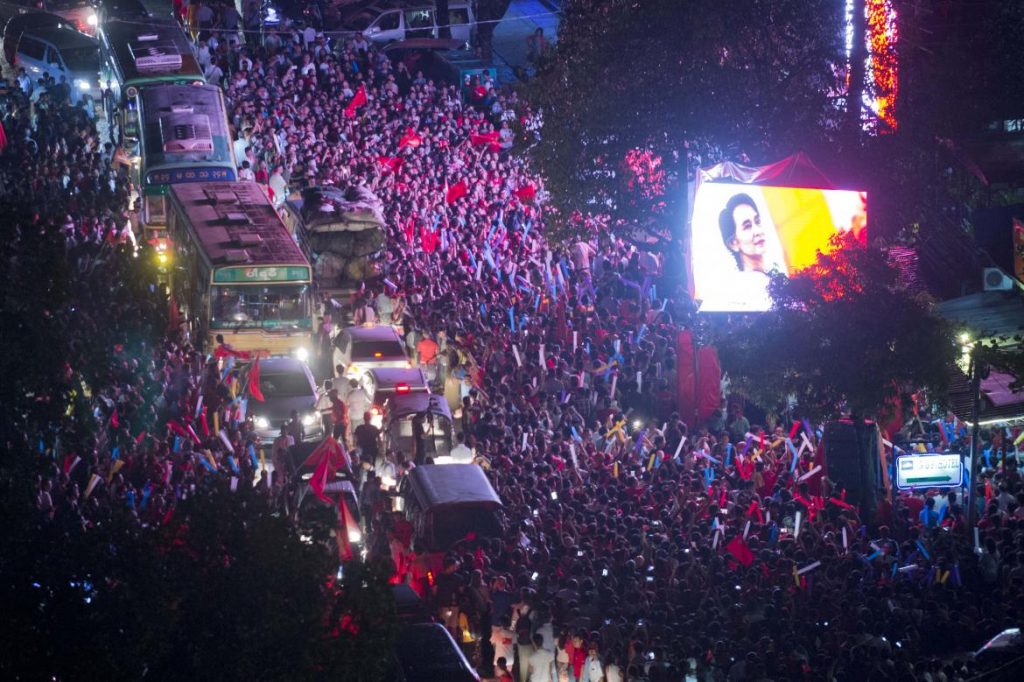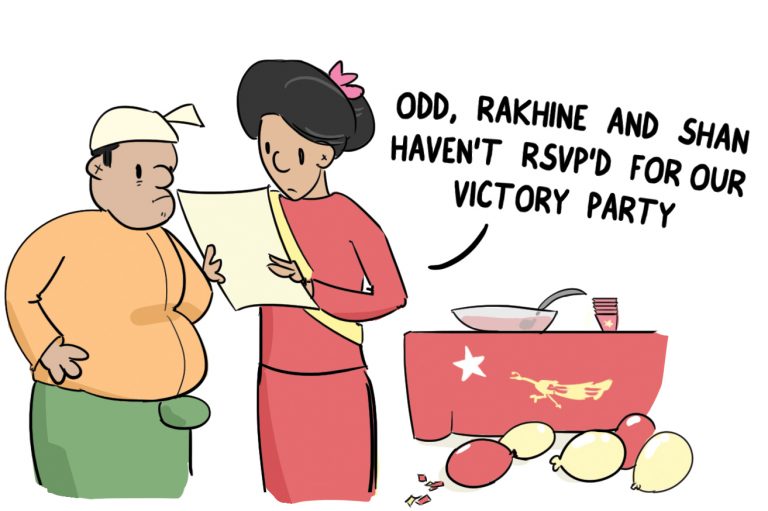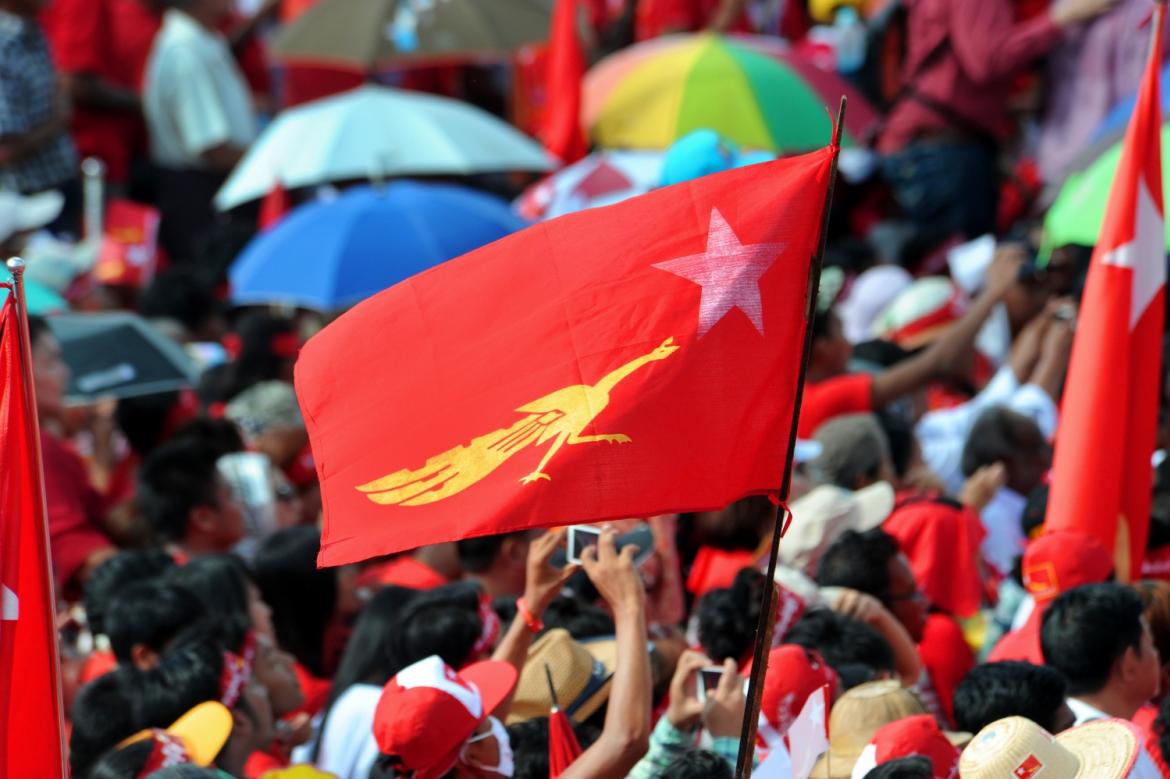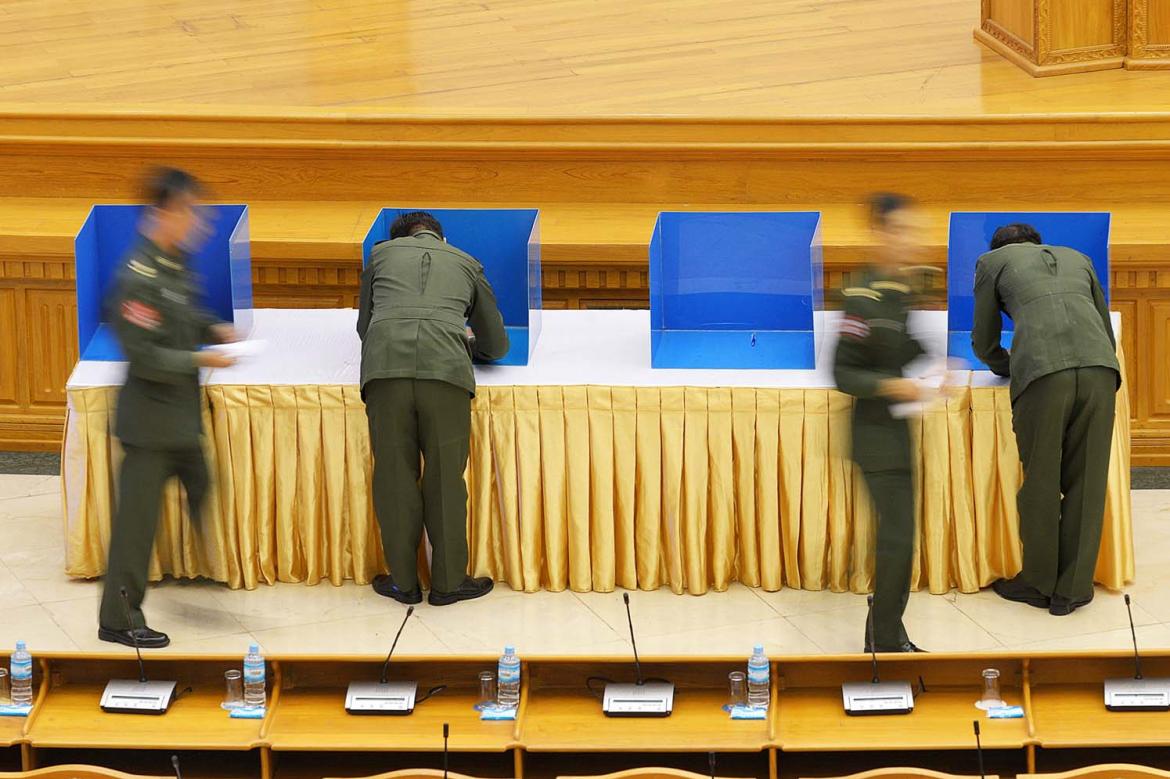Frontier looks back at the biggest Myanmar news stories of 2015.
February: Kokang conflict erupts
Heavy fighting erupted after a Kokang rebel group, the ethnic Chinese Myanmar National Democratic Alliance Army, launched an assault on February 9 aimed at seizing the regional capital, Laukkai, prompting a big counter-offensive from the Tatmadaw. The fighting in the Shan State region on the border with China claimed the lives of dozens of Tatmadaw and MNDAA fighters and displaced tens of thousands of civilians, most of whom sought refuge on the Chinese side of the border. President U Thein Sein imposed martial law on the region on February 17 and it was not lifted until November 18.
March 5: Swan Arr Shin returns
A demonstration outside Yangon City Hall in support of student protesting for education reform was violently broken up within minutes by uniformed police and plainclothes thugs wearing red armbands on which “duty” was written in Myanmar. The incident was notable for marking the return of the plainclothes Swan Arr Shin goons, who gained notoriety in 2007 when they were deployed to crush the monk-led protests known as the Saffron Revolution.
March 10: Letpadan crackdown
A standoff at Letpadan in Bago Region, where the authorities had halted a column of students marching to Yangon as part of nationwide protests against the National Education Law, ended amid brutal scenes when baton-wielding police attacked the protesters. More than 100 people were arrested in scenes reminiscent of the dark days of the junta. The NLD and international human rights watchdogs condemned the violence, but presidential spokesperson U Ye Htut said the police had acted “according to crackdown procedures”, though he acknowledged that some officers may have overreacted. In a report released in September, the Myanmar National Human Rights Commission called for legal action against police who failed to follow “correct procedures”. It also called for action against students who threw stones at police.
April 27: Parliament adopts Population Control Law
The Union Parliament approved the Ma Ba Tha-drafted Population Control Bill that requires women to space births 36 months apart. The law, one of a package of four laws concerning race and religion, also allows regional and state governments “to request a presidential order limiting reproductive rates if it is determined that population growth, accelerating birth rates, or rising infant or maternal mortality rates are negatively impacting regional development”. The law clearly refers to Rakhine State, where ethnic Rakhine Buddhists complain about an increase in the Muslim population. President U Thein Sein signed the bill into law in May.
May 1: The ‘boat people’ crisis
In early May, a mass grave was discovered at a transit camp for victims of human trafficking in Thailand. The discovery led to a crackdown on trafficking gangs, triggering a chain of events that resulted in hundreds of people from Rakhine State and Bangladesh being stranded on boats in the Andaman Sea and Bay of Bengal. Hundreds of boat people were rescued at sea during the crisis. They included 935 rescued by the Myanmar navy in two incidents in May. Myanmar said they were all Bangladeshis but Dhaka said later checks showed 781 were citizens of Bangladesh. Three weeks later more mass graves were discovered at a traffickers’ camp on the Malaysian side of the border with Thailand.
Support more independent journalism like this. Sign up to be a Frontier member.
A regional meeting held in Bangkok in response to the crisis produced an agreement by the participating countries to work together to solve irregular migration but a root cause of the problem, the oppression and marginalisation of Rohingya Muslims in Rakhine, remained unaddressed.
May/June: Ko Par Gyi case drags on
Freelance journalist and activist Ko Par Gyi, whose real name was Ko Aung Kyaw Naing, died on October 4, 2014, while in military custody in Mon State’s Kyaikmayaw Township. The case attracted national and international media attention and led to a civil court case. It was revealed in May this year that two soldiers accused of killing Ko Par Gyi as he allegedly tried to escape custody were acquitted by a military court the previous November of charges of death by negligence. The Myanmar National Human Rights Commission recommended in a report in December last year that the two suspects be tried in a civil rather than a military court. A ruling is yet to be handed down in the civil case. It was launched by Ko Par Gyi’s widow, Ma Thandar, who won a seat for the National League for Democracy in the November 8 election.
June 10: NLD leader visits China
The invitation extended to National League for Democracy leader Daw Aung San Suu Kyi to visit China was a clear indication that Beijing was widening its horizon beyond Nay Pyi Taw and preparing for a change of government after the November 8 election. The opposition leader met President Xi Jinping during the five-day visit and clearly tried to outgrow her democracy darling of the West image, showing she was willing to play ball with the Chinese as well.
Mid July-September: The flood disaster
Prolonged torrential rain led to devastating flooding that affected 12 of the nation’s 14 states and regions and disrupted the lives of about a million people. Hardest hit were Ayeyarwady Region, and Rakhine and Chin states, where the flooding was exacerbated by a typhoon. Official figures put the death toll from the natural disaster at more than 100 and the number of destroyed houses at 15,239. The Ministry of Agriculture said 687,200 acres of farmland were damaged. The generosity and dedication of the community response to the disaster attracted widespread praise.
July 23: Aung Thaung dies
One of the most despised members of the former junta, U Aung Thaung, died in hospital in Singapore from complications arising from a stroke that he had suffered in Nay Pyi Taw. The extremely wealthy former Minister of Industry (1) in the military government was said to have been the bagman for junta strongman, former Senior General Than Shwe. U Aung Thaung, who was a central figure in the Union Solidarity and Development party and one of its election campaign stategists, reportedly organised the plainclothes vigilante group known as Swan Arr Shin and was close to the monk-led hardline nationalist group, Ma Ba Tha. In 2014, U Aung Thaung was blacklisted by the United States, which accused him of “perpetuating violence, oppression and corruption”.
August 2: NLD rejects 88 Generation candidates
The National League for Democracy rejected applications from 17 prominent members of the 88 Generation Peace and Open Society movement to contest the November elections for the party. They had reportedly been promised slots on the candidate list, but ultimately party leader Daw Aung San Suu Kyi blocked entry of the high profile candidates. Prominent independent Yangon regional MP Daw Nyo Nyo Thin, one of the nation’s most outspoken anti-corruption campaigners, was also rejected as a candidate by the NLD. Free speech advocate and former political prisoner Ko Nay Phone Latt was accepted to run for the NLD, but the party did not choose any Muslim candidates.
August 12: Shwe Mann ousted
Pyithu Hluttaw Speaker Thura U Shwe Mann was ousted as the chairman of the ruling Union Solidarity and Development Party in a midnight “coup” at the party’s Nay Pyi Taw headquarters. There was much speculation that President U Thein Sein, whom Thura U Shwe Mann had replaced as party chairman, was behind the ouster, or that former Senior General Than Shwe had played a role behind the scenes. Thura U Shwe Mann’s removal as party chairman came after he antagonised the Tatmadaw leadership by allying himself with opposition leader Daw Aung San Suu Kyi and blocked recently retired military officers from being selected by the USDP as election candidates.
August 26: Religious Conversion Law and Interfaith Marriage Law enacted
President U Thein Sein enacted another two of the four controversial race and religion laws drafted by Ma Ba Tha. The international community condemned the laws for violating international treaties to which Myanmar is a signatory and for breaching human rights.
August 31: Monogamy law enacted
President U Thein Sein signed into law the monogamy legislation drafted by Ma Ba Tha and approved by parliament on August 21. The legislation prohibits having more than one spouse, or living with an unmarried partner. The law was widely believed to target Muslims, but some of the first cases to be filed with police have involved Buddhist women with adulterous husbands.
October 4: Ma Ba Tha celebrates
Ma Ba Tha ended a month-long celebration of the enactment of the race and religion laws with a gathering at Yangon’s Thuwanna Stadium attended by a capacity crowd of 30,000, almost all of whom were monks. The event was broadcast live on national television, strengthening speculation about collusion between the government and Ma Ba Tha. The Straits Times reported that Ma Ba Tha spent K70 million (about US$53,000) on the celebrations.
October 23: the $31 billion jade ‘heist’
In a report based on a year-long investigation, London-based watchdog group Global Witness estimates the value of the illicit trade in jade during 2014 at US$31 billion, or nearly half of Myanmar’s GDP. Global Witness says the s jade trade may be the world’s “biggest natural resources heist”. The watchdog said the sector was “secretly controlled by networks of military elites, drug lords and crony companies associated with the darkest days of junta rule.”
November 8: election day
For many it was the political highlight of the past five years. For the National League for Democracy, November 8 was much more than that. After the “stolen victory” of the 1990 election, November 8 was the day it was to correct an historical injustice.
The vote was conducted almost without a hitch, despite criticism of the Union Election Commission ahead of the elections, especially over the mismanagement of voter lists and the disqualification of almost all Muslim candidates. There was controversy in Lashio over advance votes favouring Vice President Sai Mauk Kham, but polling was generally calm and orderly, and the 40,000 freshly recruited special election police had little to do. Within hours of the polls closing it became clear that the National League for Democracy was heading for a sweeping victory, even in ethnic minority regions where local parties were expected to perform strongly. The exceptions were Rakhine and Shan states, where ethnic party candidates won twice as many seats in the regional assemblies as the NLD.
November 12: NLD wins absolute majority
After days of results trickling in, it was acknowledged that the National League for Democracy had won an absolute majority in parliament. Many prominent members of the ruling Union Solidarity and Development Party, notably its acting chairman, Pyithu Hluttaw MP U Htay Oo, who lost his Hinthada Township seat to the NLD, were gracious in defeat. The landslide allows the NLD to nominate two of the three presidential candidates. But will the army and the USDP allow the NLD to do so?
November 17: Students end hunger strike
After 20 days of fasting, the last of twelve students agreed to end a hunger strike called to support demands for the release of all political prisoners. The strike was halted in response to requests from National League for Democracy leader Daw Aung San Suu Kyi and activist monks. Ko Aung Hmaing San, who initiated the hunger strike on October 23, told the media that the protest had been postponed for the duration of the transition to a new government.
November 21: Deadly landslide in Hpakant
About 114 people were killed by a landslide of tailings from jade mining operations at Hpakant in Kachin State. Hpakant, the centre of the nation’s jade mining industry, attracts thousands of itinerant workers who fossick through the tailings to find pieces of the precious gem. Landslides caused by the irresponsible dumping of tailings are common in Hpakant. Between 30 and 60 people were killed by a landslide at a mine there in April.
December 4: Than Shwe and the Lady meet
After post-election meetings with President U Thein Sein and Tatmadaw Commander-in-Chief Senior General Min Aung Hlaing, National League for Democracy leader Daw Aung Suu Kyi met former junta leader U Than Shwe for secret talks in Nay Pyi Taw. The meeting was announced by a grandson of U Than Shwe, who is still believed to be a major force behind the scenes. After what was reported to have been a cordial meeting the NLD leader suggested there was an “agreement” and that the former dictator said “that it is true that Aung San Suu Kyi is the future leader of the country”. Analysts said the meeting was an indication that the army was ready for a transfer of power. Others expressed concern that Daw Aung San Suu Kyi had promised the army continued impunity in exchange for the presidency, a position she could assume if section 59(f) of the constitution was suspended, a proposal supported by a prominent member of the Union Solidarity and Development Party, Thura U Aung Ko.







